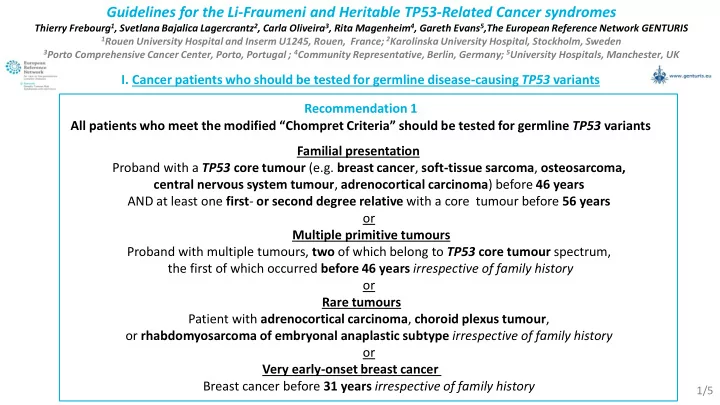

Guidelines for the Li-Fraumeni and Heritable TP53-Related Cancer syndromes Thierry Frebourg 1 , Svetlana Bajalica Lagercrantz 2 , Carla Oliveira 3 , Rita Magenheim 4 , Gareth Evans 5 ,The European Reference Network GENTURIS 1 Rouen University Hospital and Inserm U1245, Rouen, France; 2 Karolinska University Hospital, Stockholm, Sweden 3 Porto Comprehensive Cancer Center, Porto, Portugal ; 4 Community Representative, Berlin, Germany; 5 University Hospitals, Manchester, UK I. Cancer patients who should be tested for germline disease-causing TP53 variants Recommendation 1 All patients who meet the modified “ Chompret Criteria” should be tested for germline TP53 variants Familial presentation Proband with a TP53 core tumour (e.g. breast cancer , soft-tissue sarcoma , osteosarcoma, central nervous system tumour , adrenocortical carcinoma ) before 46 years AND at least one first - or second degree relative with a core tumour before 56 years or Multiple primitive tumours Proband with multiple tumours, two of which belong to TP53 core tumour spectrum, the first of which occurred before 46 years irrespective of family history or Rare tumours Patient with adrenocortical carcinoma , choroid plexus tumour , or rhabdomyosarcoma of embryonal anaplastic subtype irrespective of family history or Very early-onset breast cancer Breast cancer before 31 years irrespective of family history 1/5
I. Cancer patients who should be tested for germline disease-causing TP53 variants Recommendation 2 Children and adolescents should be tested for germline TP53 variants if presenting with: Hypodiploid acute lymphoblastic leukemia (ALL); or Otherwise unexplained sonic hedgehog -driven medulloblastoma ; or Jaw osteosarcoma Recommendation 3 Patients who develop a second primary tumour , within the radiotherapy field of a first core TP53 tumour which occurred before 46 years , should be tested for germline TP53 variants Recommendation 4 a. Patients older than 46 years presenting with breast cancer without personal or familial history fulfilling the “ Chompret Criteria” should not be tested for germline TP53 variants b. Any patient presenting with isolated breast cancer and not fulfilling the “ Chompret Criteria”, in whom a disease-causing TP53 variant has been identified, should be referred to an expert MDT for discussion Recommendation 5 Children with any cancer from southern and south-eastern Brazilian families should be tested for the p.R337H Brazilian founder germline TP53 variant 2/5
II. Pre-symptomatic Testing Recommendations Recommendation 6 Adult first-degree relatives of individuals with germline disease-causing TP53 variants should be systematically offered testing for the same germline TP53 variant Recommendation 7 The testing in childhood , from birth , of first-degree relatives of individuals with germline disease-causing TP53 variants should be systematically offered , if updated knowledge, based on databases and registries, shows that the variant can be considered as a high cancer risk TP53 variant conferring a high cancer risk in childhood : • The index case has developed a childhood cancer ; or • Childhood cancers have been observed within the family ; or • This variant has already been detected in other families with childhood cancers ; or • This variant corresponds to a dominant-negative missense variant 3/5
II. Pre-symptomatic Testing Recommendations Recommendation 8 The testing in childhood of first-degree relatives of individuals with germline disease-causing TP53 variants should not be systematically offered , if updated knowledge, based on databases and registries, shows that the variant can be considered as a low cancer risk TP53 variant and does not confer a high cancer risk in childhood: • The index case has not developed a childhood cancer; and • Childhood cancers have not been observed within the family; and • This variant has not already been reported in other families with childhood cancers ; and • This variant does not correspond to a dominant-negative missense variant Recommendation 9 The testing in childhood of first-degree relatives of individuals with germline disease-causing TP53 variants should be discussed with their parents if cancers have occurred in early adulthood (before the age of 31 years) within the family, or if there is insufficient evidence in the databases or registries to determine the childhood cancer risk This discussion should address the burden , and uncertain benefits , of surveillance in childhood, before a decision is made whether to test the child for germline disease-causing TP53 variants 4/5
III. Surveillance Protocol in carriers of germline disease-causing TP53 variants Exam Periodicity Age to start Age to Condition Evidence end Every 6 months Birth 17 years Moderate Clinical examination * Annual 18 years - Moderate High cancer risk TP53 variant or Birth - Moderate Whole-Body MRI previous treatment Annual without gadolinium 18 years - Strong Breast MRI Annual 20 years Until 65 years Strong Birth 18 years High cancer risk TP53 variant Moderate Brain MRI** Annual 18 years Until 50 years Moderate Abdominal ultrasound Every 6 months Birth Until 18 years Strong Urine steroids Every 6 months Birth - Weak 18 years - Weak Colonoscopy*** Every 5 years * With specific attention to signs of virilisation or early puberty, and measurement of arterial hypertension and detection of basal cell carcinoma in radiotherapy fields; **The first scan should be conducted with I.V. Gadolinium enhancement; in children, brain MRI should alternate with the WBMRI so that the brain is imaged at least every 6 months *** Only if the carrier received abdominal radiotherapy for the treatment of a previous cancer, or if there is a familial history of colorectal tumours suggestive of an increased genetic risk 5/5
Recommend
More recommend